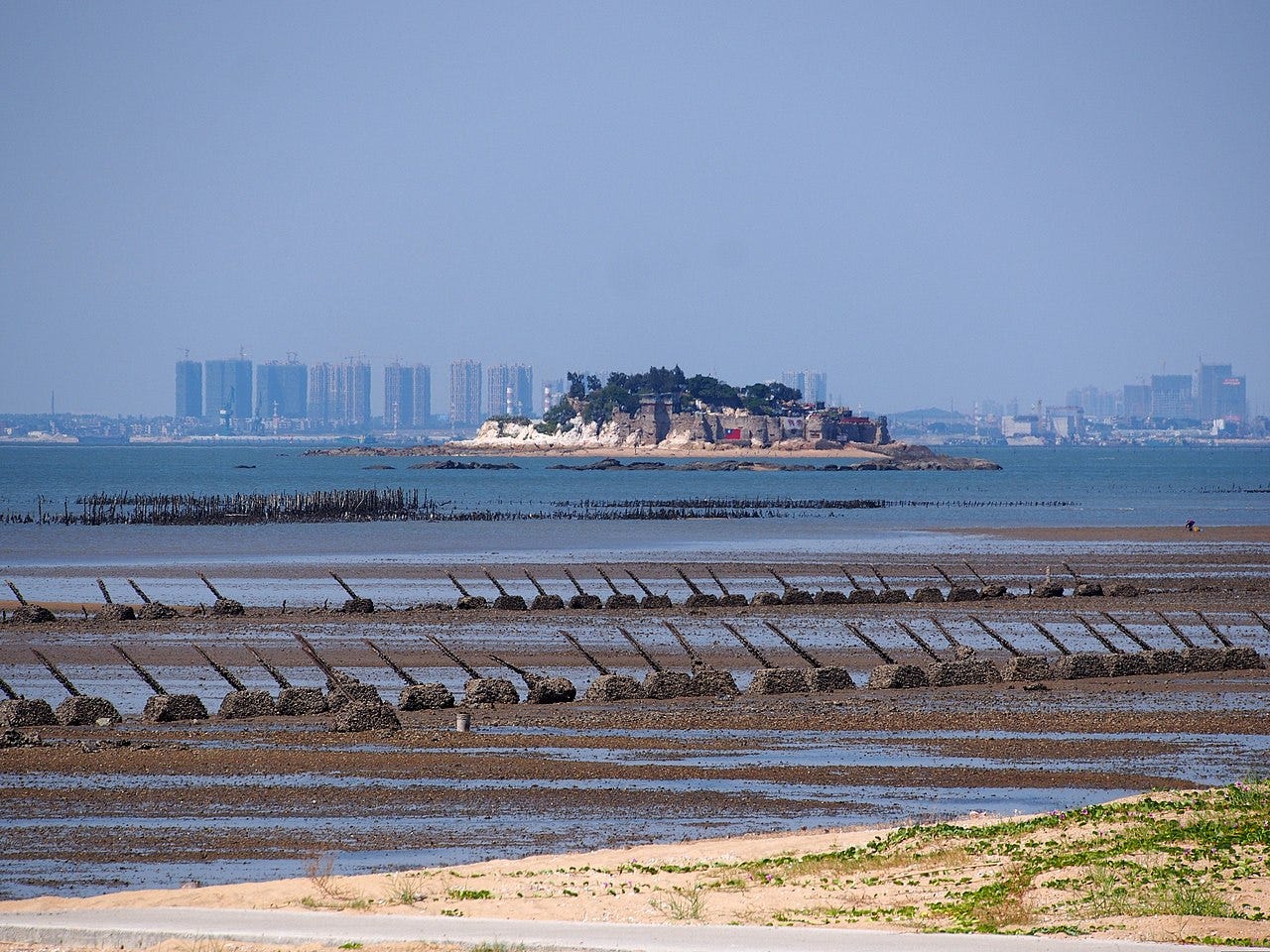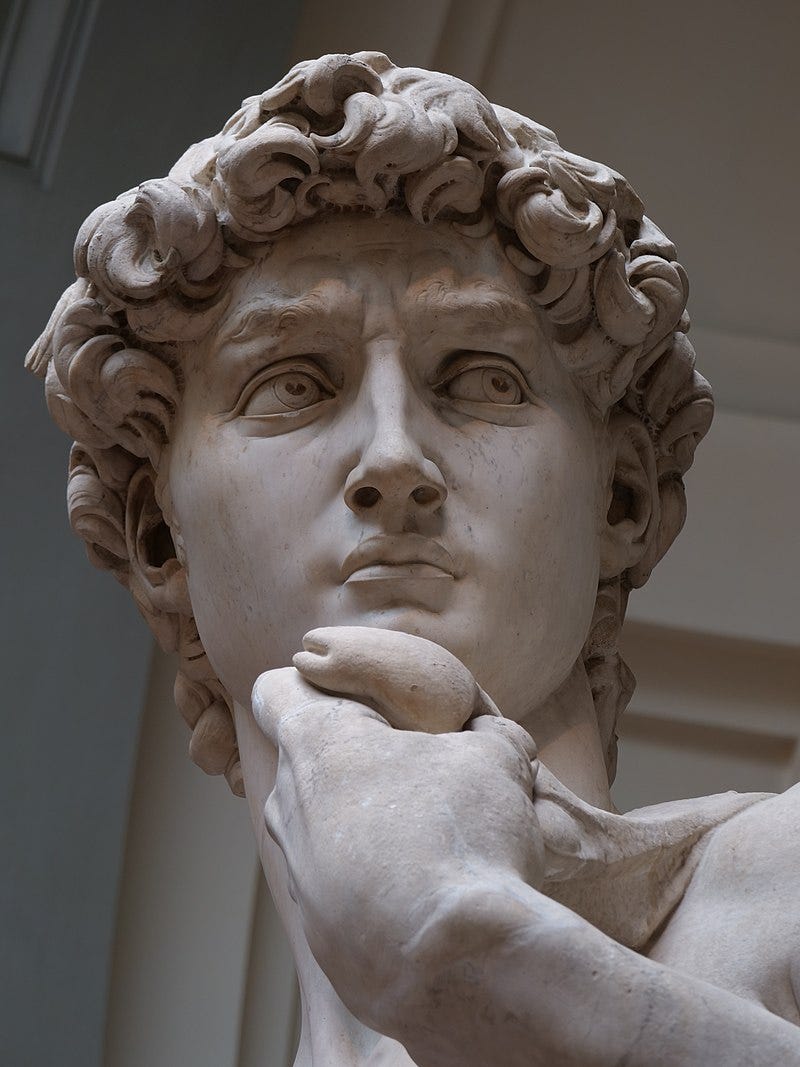Michelangelo’s David towers above you. A marble colossus, immaculately carved, every vein and tiny muscle defined such that you’re almost fooled into thinking him alive. His expression wary yet defiant, as he stares up and across at his unseen larger foe. It is in every way a masterwork.
The Florence in which the statue was unveiled was a place of extraordinary artisans, thinkers, and inventors. A small democratic city-state surrounded by larger and more powerful neighbours, it was the birthplace of modern banking and home of such names as Da Vinci, Botticelli, and Donatello. David stood outside the town hall, facing down the Borgias Papal States in Rome, embodying in the eyes of Florentines the republic’s strength, determination, and defiance in the face of a legendarily corrupt and voracious regime.
One of Michaelangelo’s Florentine contemporaries was a city administrator, poet, and historian by the name of Machiavelli, now famous for his treatise ‘The Prince’. The utilitarian ‘ends justify the means’ thinking he pioneered is rightly reviled as a system of personal ethics, (his name has since become synonymous with scheming and evil), but to be properly understood must be contextualised first as a product of an extraordinarily miserable period of history1, and second not as advice for an individual, but rather as a now broadly accepted framework for statecraft and making murky decisions (noting of course than the ‘ends’ of the ‘means’ are also ends that must be justified)2.
In the same vein, Taiwanese strategic policy cannot be properly understood without also understanding this small republic’s relationship to the Goliath across the Strait.

Cross-strait tensions between Taiwan and Mainland China are increasing visible internationally3. Taiwan’s presidential election earlier in January was widely reported on, and served internally as something of a referendum on how the island nation wished to proceed. The incumbent DPP party implicitly favours independence, the opposition KMT - rapprochement. Shaking off the potential spoiler of a newcomer third party seeking to establish a moderate niche between the two incumbents, the victory of DPP presidential candidate Lai Ching-Te in the Jan 13th election is another sign of an increasingly independently-minded Taiwanese people.
The Chinese Communist Party (CCP) under Mao, and nationalist Kuomintang (KMT) under Chiang Kai-Shek, had been at each other’s throats since the 1927 Shanghai Massacre. They united against a common occupying enemy, but with Japan’s defeat in 1945 soon resumed hostilities. Millions died in the resulting civil war, lasting years until the KMT was defeated and forced to retreat to Taiwan in 1949 with 2 million beleaguered troops and their families and supporters, declared martial law, brushed aside the local Taiwanese government, and established the state of the Republic of China (as Taiwan is still officially known).
Despite their defeat, the KMT harboured designs to retake the Mainland for many decades, including detailed invasion plans, regular military training exercises, and even offers to participate in the Vietnam War in return for American support. Instead, the US strongly opposed the plan, instead working to achieve a decisive blow in the Cold War and split the Chinese communists from their Soviet allies.
Only with Chiang’s death in 1975 did the KMT give up on its ambitions of reconquest, though martial law remained under the presidency of Chiang’s son until 1987. It was only with a series of democratic reforms starting in 1991 that the Taiwanese people began to chart their own path independent of the legacy of the Civil War. From the perspective of the Communist leaders, they’ve been at war with the KMT since the inception of their party. Bringing the nationalists to heel is a core part of their raison d’etre. That the R.O.C. has decided to hold elections is of little consequence to their way of thinking.
Today, the two nations share considerable ties. A common language, a shared cultural legacy, and many familial connections. China is the largest importer of Taiwanese goods (twice that of their second largest trade partner - the US). It’s the largest receiver of Taiwanese direct investment. Taiwanese imports tell a similar story - imported goods from China are almost double by value that of the next highest, Japan.
Unfortunately, where former communist leaders were content to play the long game, build their strength, deepen these connections, and work towards an eventual peaceful unification, Chinese Premier Xi Jinping is a markedly different leader who favours bringing the long-simmering question to a head.
Authoritarian states are capable of remarkably stable leadership, but the concentration of power makes them prone to sudden shifts. Modern China was built under the leadership of Deng Xiaoping and his chosen successors, rebuilding a nation devastated by the cultural revolution through gradual economic and social liberalisation. Xi instead favours centralised control, an increasingly totalitarian surveillance state, and aggressive ‘Wolf Warrior Diplomacy’. These measures have caused a major economic slowdown, significant unrest over Covid response mismanagement4, and alienated China from most of its regional partners.
Unfortunately, troubles at home have encouraged Xi to pursue jingoism and militarism abroad. The Chinese Coast Guard is now engaged in a permanent harassment campaign of Vietnamese and Filipino-controlled islands. After decades of effort to bring India into their diplomatic fold, Red Army troops once again engage in border skirmishes with the Indian Army, while China is moving to block India from a permanent seat on the UN Security Council.
Losing ground, Xi has made it clear in his speeches that his primary objective is regaining control of an island only controlled by the Mainland for eight years in all of history5. Where previous leaders were content for the situation to remain ambiguous, to Xi Taiwan is a symbol of a successful, free, and democratic China. The irony is that his actions, often more symbolic than substantive6, are making it so for the rest of the world also.
China now conducts daily incursions into Taiwanese airspace and territorial waters, while flooding Taiwanese social media with CCP propaganda. Chinese military expenditure dwarfs that of Taiwan and, by some estimates, rivals that of the US. Its industrial capacity is hundreds of times greater - the US is not the manufacturing powerhouse it once was, and has struggled to ramp production to cover even a fraction of what’s required to support Ukraine, let alone direct conflict with another great power.
Taiwan, for many decades, was able to rely on its vast technological advantage over a Mainland economically stunted by the devastating effects of Maoism and the implicit guarantee of overwhelming U.S. support. Consequently, an attitude of complacency developed. Compulsory military service was allowed to degrade into a ‘summer camp’ that provides little actual training, while the professional military is undermanned and ill-equipped to serve as an adequate deterrent, even with Taiwan’s considerable natural defences. Efforts are underway to rectify these deficiencies, but only time will tell if these preparations prove sufficient.
Taiwan is a small mountainous island with little buildable land and almost completely lacking in natural resources. Taiwanese digital strategy must address a torrent of CCP propaganda and cyber-warfare. Housing costs have spiralled out of control, placing enormous pressure on the young, and contributing to a population collapse that will undermine Taiwan’s future ability to defend itself. The sunsetting of their nuclear power programme in 2019 places the island almost completely dependent on imported energy and therefore more vulnerable to a shipping blockade or disruption.
We see then, that like David or Machiavelli, many of Taiwan’s challenges can only be properly understood in the context of its regional neighbour. We’ll take a closer look at these challenges, and some innovative solutions, in upcoming posts.
As one example, life expectancies during this period dropped from 35-40 during the Middle Ages to as low as 18 as war, famine, plagues, and inquisitions swept through Renaissance Europe. Technological progress made transport easier than ever while bringing greater rewards for trade and warfare. Rampant disease was the natural consequence until modern medicine and natural immunities rising from centuries of natural selection arose.
Despite its logical appeal, utilitarianism makes for a poor system of personal ethics. Our understanding of the full consequences of our actions is too limited, and the temptation for self-delusion too great. However, even as we expect our leaders to abide by common moral norms personally, we expect them to use utilitarian thinking in the formation and execution of policy - conducting a war or allocating scarce resources across thousands of opportunities to improve traffic safety or life-saving drugs, for example.
Not least because of Taiwan’s strategic importance thanks to a near-monopoly of the production of the cutting-edge chips used in the development of artificial intelligence.
Shanghai was particularly hard hit, with residents barred from leaving their buildings for months, even to collect food, while government officials carried out obsolete and ineffective control measures such as regular surface disinfections while the rest of the world focused on controlling airborne spread.
Even then, it was the Manchu Qing Empire that did so, not the Han Chinese.
The CCP is obsessed with the language Taiwan and others use. Suggestions that Taiwan might drop the ‘Republic of China’ name have been met with extreme threats. Inordinate pressure is placed on small island nations that recognise Taiwan diplomatically to switch allegiance. Philippine President Marcos recently received a broadside from the CCP for being too warm in his congratulations to Taiwanese President-Elect Lai. The irony is that China’s bluster over de jure recognition only serves to increase de facto international recognition.



Does Taiwan still require its diplomatic allies to recognize it as the sole legitimate government of "China" ?
Wikipedia is a bit confusing on this point
https://en.m.wikipedia.org/wiki/Foreign_relations_of_Taiwan